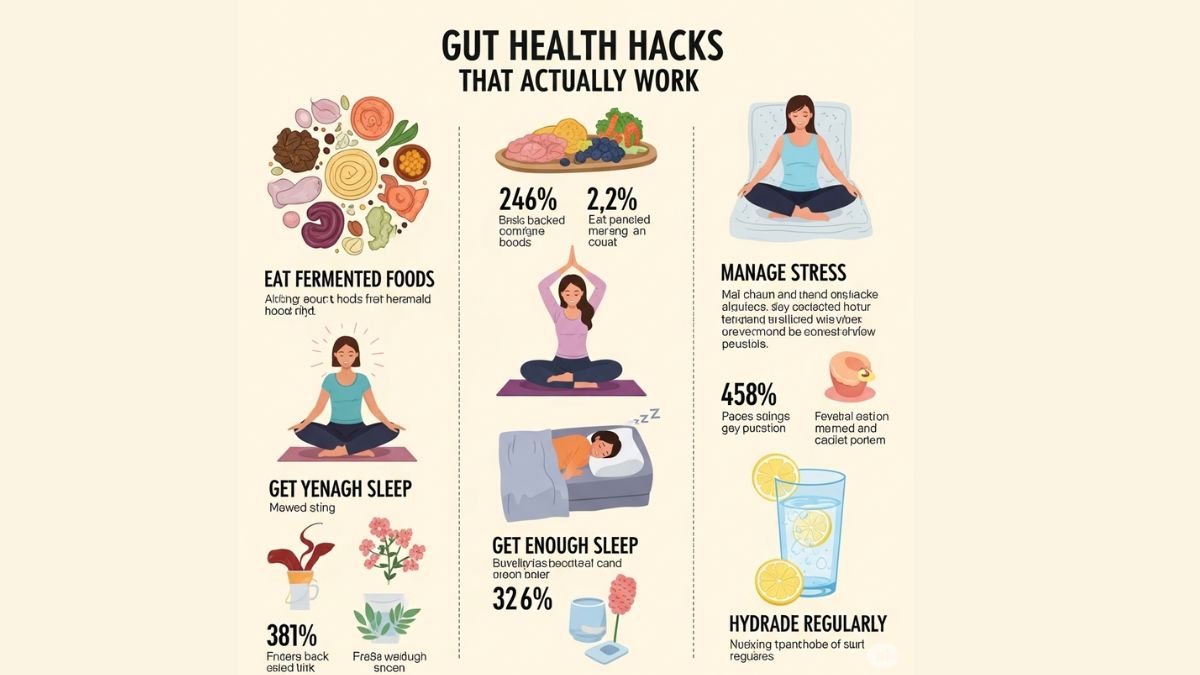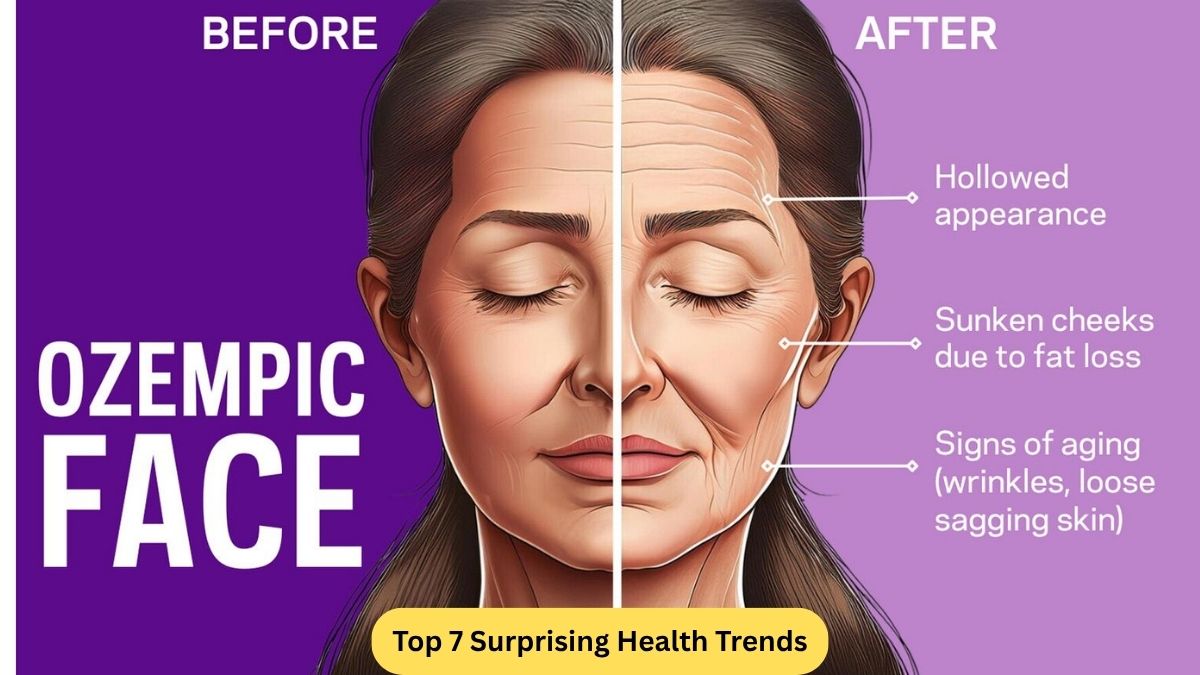In 2025, gut health is more than just a trend—it’s a revolution. Scientists and wellness experts are now placing the gut microbiome at the center of human health. From digestion to immunity and even emotional well-being, your gut bacteria play a bigger role than you might think. But what are the most effective, science-backed ways to support your gut health?
In this article, we’ll explore proven gut health hacks you can implement today, the latest research driving this movement, and why prioritizing your digestive system may be the best wellness decision you ever make.
What Is Gut Health and Why Is It So Important?
Your gut is home to over 100 trillion microbes—a delicate and diverse ecosystem of bacteria, viruses, fungi, and other microorganisms that make up your gut microbiome. This complex internal world influences nearly every aspect of your health:
- Digestion: It helps break down food and absorb nutrients.
- Immunity: Around 70% of your immune system is located in your gut.
- Mood and Brain Function: The gut produces about 90% of your body’s serotonin—a key mood-regulating neurotransmitter.
- Weight and Metabolism: A balanced microbiome is linked to healthy body weight and reduced risk of obesity.
Latest Scientific Findings on Gut Health (2024–2025)
Recent research from institutions like the National Institutes of Health, The Microbiome Project, and UK Biobank has confirmed:
- Gut bacteria composition can predict chronic disease risk, including type 2 diabetes, depression, and inflammatory bowel disease.
- Poor gut diversity is associated with anxiety and cognitive decline.
- Prebiotics and fiber-rich foods are among the most effective, low-risk tools to improve microbiome diversity.
The good news? You don’t need expensive detox programs or extreme diets to support your gut. You just need to follow a few simple, consistent habits.
1. Increase Fiber Intake (Daily!)
Fiber is the undisputed hero of gut health. It feeds the “good” bacteria in your gut, helping them thrive and outcompete harmful microbes. The fermentation of fiber by these bacteria produces short-chain fatty acids (SCFAs), which are essential for gut lining integrity and inflammation control.
Best High-Fiber Foods:
- Oats – Excellent source of soluble fiber (beta-glucan)
- Berries – Rich in antioxidants and fiber
- Beans and Lentils – Promote healthy gut motility
- Chia and Flaxseeds – Omega-3s + prebiotic fiber
Expert Tip:
Aim for 25–35 grams of fiber per day, and increase slowly to avoid bloating. Drink plenty of water to help your digestive system adapt.
2. Try Fermented Foods
Fermented foods are natural probiotics—they contain live, active cultures that can replenish and diversify your gut flora.
Top Gut-Friendly Fermented Foods:
- Yogurt with live cultures (look for “Lactobacillus” or “Bifidobacterium” on the label)
- Kimchi – A Korean favorite packed with flavor and microbes
- Sauerkraut – Make sure it’s raw and unpasteurized
- Kombucha – A bubbly, tea-based probiotic drink
Why It Works:
Fermented foods introduce beneficial bacteria that may improve digestion, support immune function, and reduce inflammation.
3. Cut Back on Processed Foods and Sugar
One of the biggest threats to your gut health is the Western-style diet—high in sugar, low in fiber, and full of preservatives. Ultra-processed foods can feed the “bad” bacteria, reduce microbial diversity, and cause gut dysbiosis (an unhealthy microbial imbalance).
Avoid or Limit:
- Sugary snacks and sodas
- Refined grains and flours
- Artificial sweeteners (especially sucralose and aspartame)
- Deep-fried or heavily processed packaged foods
Better Choices:
- Whole grains (quinoa, brown rice)
- Fresh vegetables
- Healthy fats (avocado, olive oil)
- Lean proteins (eggs, fish, tofu)
4. Add Prebiotic-Rich Foods and Supplements
Prebiotics are non-digestible fibers that act as fertilizer for your gut bacteria. Unlike probiotics (which introduce new bacteria), prebiotics feed the existing beneficial microbes already living in your system.
Best Prebiotic Foods:
- Garlic
- Onions
- Leeks
- Asparagus
- Bananas (slightly green)
- Jerusalem artichokes
Supplement Option:
Look for inulin, FOS (fructooligosaccharides), or resistant starch in prebiotic supplements. Always start with a small dose to avoid bloating.
5. Prioritize Sleep, Stress Reduction, and Movement
Gut health isn’t just about food. Sleep, stress, and exercise are equally important.
- Chronic stress releases cortisol, which can weaken the gut barrier and reduce microbial diversity.
- Poor sleep alters gut flora and raises inflammation.
- Exercise increases the abundance of beneficial bacteria.
Daily Gut-Supporting Habits:
- Get 7–9 hours of quality sleep
- Practice mindfulness, yoga, or meditation
- Take a brisk walk or move your body for at least 30 minutes daily
6. Stay Hydrated
Water supports regular bowel movements and helps nutrients absorb more efficiently. Dehydration can slow digestion and contribute to constipation, disrupting your gut rhythm.
How Much Water?
Aim for 2–3 liters per day, or more if you’re active. Add lemon, cucumber, or mint for a gut-friendly hydration boost.
7. Don’t Overuse Antibiotics
Antibiotics can wipe out both harmful and beneficial bacteria, leading to gut imbalance. While necessary in some cases, overuse or misuse can harm your microbiome long-term.
What You Can Do:
- Only take antibiotics when prescribed
- Pair with a probiotic supplement during and after use
- Eat extra fermented and fiber-rich foods during recovery
The Gut–Brain Connection: Mental Health Starts in the Gut
One of the most fascinating discoveries in recent years is the gut-brain axis—the two-way communication between your digestive system and brain. An imbalance in gut bacteria is now linked to:
- Anxiety and depression
- Brain fog and fatigue
- Poor focus and memory
By nourishing your gut, you’re not just helping your digestion—you’re supporting your emotional and mental well-being.
When to See a Doctor
If you experience persistent gut-related symptoms, such as:
- Chronic bloating or gas
- Irregular bowel movements
- Skin issues like eczema or acne
- Food sensitivities or fatigue
… it’s worth consulting with a healthcare provider or registered dietitian. In some cases, microbiome testing or advanced diagnostics may be needed.
Final Thoughts: Your Gut Deserves Attention
Supporting your gut health doesn’t have to be complicated or expensive. By focusing on fiber-rich foods, adding fermented and prebiotic ingredients, limiting processed foods, and managing lifestyle factors like sleep and stress, you can dramatically improve your digestion, mood, and immunity—naturally.
Start with one or two habits this week. Your gut (and your entire body) will thank you.








ommdiu